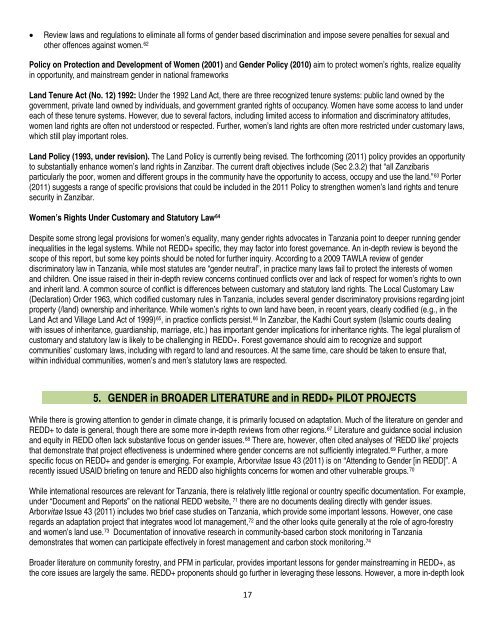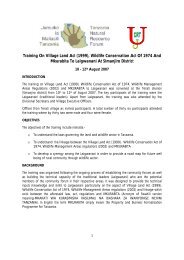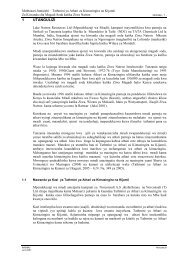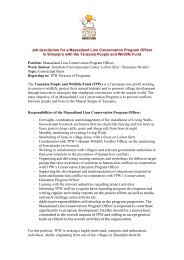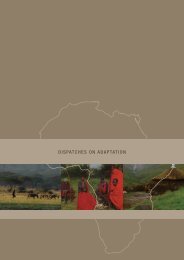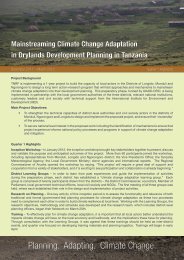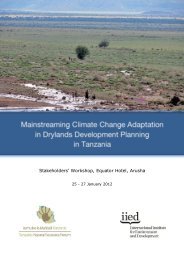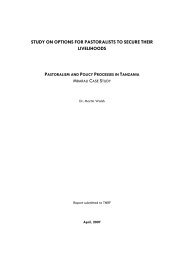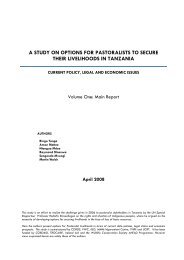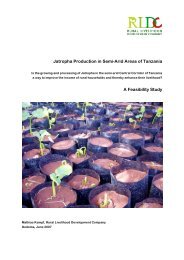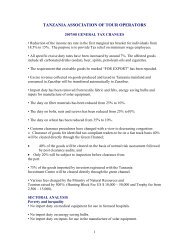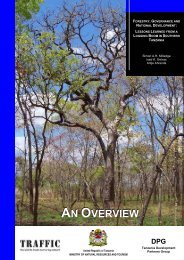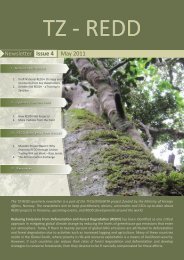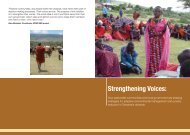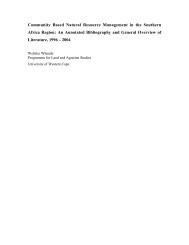Gender and REDD+ in Tanzania An overview of key issues
Gender and REDD+ in Tanzania: An overview of key issues
Gender and REDD+ in Tanzania: An overview of key issues
- No tags were found...
Create successful ePaper yourself
Turn your PDF publications into a flip-book with our unique Google optimized e-Paper software.
• Review laws <strong>and</strong> regulations to elim<strong>in</strong>ate all forms <strong>of</strong> gender based discrim<strong>in</strong>ation <strong>and</strong> impose severe penalties for sexual <strong>and</strong><br />
other <strong>of</strong>fences aga<strong>in</strong>st women. 62<br />
Policy on Protection <strong>and</strong> Development <strong>of</strong> Women (2001) <strong>and</strong> <strong>Gender</strong> Policy (2010) aim to protect women’s rights, realize equality<br />
<strong>in</strong> opportunity, <strong>and</strong> ma<strong>in</strong>stream gender <strong>in</strong> national frameworks<br />
L<strong>and</strong> Tenure Act (No. 12) 1992: Under the 1992 L<strong>and</strong> Act, there are three recognized tenure systems: public l<strong>and</strong> owned by the<br />
government, private l<strong>and</strong> owned by <strong>in</strong>dividuals, <strong>and</strong> government granted rights <strong>of</strong> occupancy. Women have some access to l<strong>and</strong> under<br />
each <strong>of</strong> these tenure systems. However, due to several factors, <strong>in</strong>clud<strong>in</strong>g limited access to <strong>in</strong>formation <strong>and</strong> discrim<strong>in</strong>atory attitudes,<br />
women l<strong>and</strong> rights are <strong>of</strong>ten not understood or respected. Further, women’s l<strong>and</strong> rights are <strong>of</strong>ten more restricted under customary laws,<br />
which still play important roles.<br />
L<strong>and</strong> Policy (1993, under revision). The L<strong>and</strong> Policy is currently be<strong>in</strong>g revised. The forthcom<strong>in</strong>g (2011) policy provides an opportunity<br />
to substantially enhance women’s l<strong>and</strong> rights <strong>in</strong> Zanzibar. The current draft objectives <strong>in</strong>clude (Sec 2.3.2) that “all Zanzibaris<br />
particularly the poor, women <strong>and</strong> different groups <strong>in</strong> the community have the opportunity to access, occupy <strong>and</strong> use the l<strong>and</strong>.” 63 Porter<br />
(2011) suggests a range <strong>of</strong> specific provisions that could be <strong>in</strong>cluded <strong>in</strong> the 2011 Policy to strengthen women’s l<strong>and</strong> rights <strong>and</strong> tenure<br />
security <strong>in</strong> Zanzibar.<br />
Women’s Rights Under Customary <strong>and</strong> Statutory Law 64<br />
Despite some strong legal provisions for women’s equality, many gender rights advocates <strong>in</strong> <strong>Tanzania</strong> po<strong>in</strong>t to deeper runn<strong>in</strong>g gender<br />
<strong>in</strong>equalities <strong>in</strong> the legal systems. While not <strong>REDD+</strong> specific, they may factor <strong>in</strong>to forest governance. <strong>An</strong> <strong>in</strong>-depth review is beyond the<br />
scope <strong>of</strong> this report, but some <strong>key</strong> po<strong>in</strong>ts should be noted for further <strong>in</strong>quiry. Accord<strong>in</strong>g to a 2009 TAWLA review <strong>of</strong> gender<br />
discrim<strong>in</strong>atory law <strong>in</strong> <strong>Tanzania</strong>, while most statutes are “gender neutral”, <strong>in</strong> practice many laws fail to protect the <strong>in</strong>terests <strong>of</strong> women<br />
<strong>and</strong> children. One issue raised <strong>in</strong> their <strong>in</strong>-depth review concerns cont<strong>in</strong>ued conflicts over <strong>and</strong> lack <strong>of</strong> respect for women’s rights to own<br />
<strong>and</strong> <strong>in</strong>herit l<strong>and</strong>. A common source <strong>of</strong> conflict is differences between customary <strong>and</strong> statutory l<strong>and</strong> rights. The Local Customary Law<br />
(Declaration) Order 1963, which codified customary rules <strong>in</strong> <strong>Tanzania</strong>, <strong>in</strong>cludes several gender discrim<strong>in</strong>atory provisions regard<strong>in</strong>g jo<strong>in</strong>t<br />
property (/l<strong>and</strong>) ownership <strong>and</strong> <strong>in</strong>heritance. While women’s rights to own l<strong>and</strong> have been, <strong>in</strong> recent years, clearly codified (e.g., <strong>in</strong> the<br />
L<strong>and</strong> Act <strong>and</strong> Village L<strong>and</strong> Act <strong>of</strong> 1999) 65 , <strong>in</strong> practice conflicts persist. 66 In Zanzibar, the Kadhi Court system (Islamic courts deal<strong>in</strong>g<br />
with <strong>issues</strong> <strong>of</strong> <strong>in</strong>heritance, guardianship, marriage, etc.) has important gender implications for <strong>in</strong>heritance rights. The legal pluralism <strong>of</strong><br />
customary <strong>and</strong> statutory law is likely to be challeng<strong>in</strong>g <strong>in</strong> <strong>REDD+</strong>. Forest governance should aim to recognize <strong>and</strong> support<br />
communities’ customary laws, <strong>in</strong>clud<strong>in</strong>g with regard to l<strong>and</strong> <strong>and</strong> resources. At the same time, care should be taken to ensure that,<br />
with<strong>in</strong> <strong>in</strong>dividual communities, women’s <strong>and</strong> men’s statutory laws are respected.<br />
5. GENDER <strong>in</strong> BROADER LITERATURE <strong>and</strong> <strong>in</strong> <strong>REDD+</strong> PILOT PROJECTS<br />
While there is grow<strong>in</strong>g attention to gender <strong>in</strong> climate change, it is primarily focused on adaptation. Much <strong>of</strong> the literature on gender <strong>and</strong><br />
<strong>REDD+</strong> to date is general, though there are some more <strong>in</strong>-depth reviews from other regions. 67 Literature <strong>and</strong> guidance social <strong>in</strong>clusion<br />
<strong>and</strong> equity <strong>in</strong> REDD <strong>of</strong>ten lack substantive focus on gender <strong>issues</strong>. 68 There are, however, <strong>of</strong>ten cited analyses <strong>of</strong> ‘REDD like’ projects<br />
that demonstrate that project effectiveness is underm<strong>in</strong>ed where gender concerns are not sufficiently <strong>in</strong>tegrated. 69 Further, a more<br />
specific focus on <strong>REDD+</strong> <strong>and</strong> gender is emerg<strong>in</strong>g. For example, Arborvitae Issue 43 (2011) is on “Attend<strong>in</strong>g to <strong>Gender</strong> [<strong>in</strong> REDD]”. A<br />
recently issued USAID brief<strong>in</strong>g on tenure <strong>and</strong> REDD also highlights concerns for women <strong>and</strong> other vulnerable groups. 70<br />
While <strong>in</strong>ternational resources are relevant for <strong>Tanzania</strong>, there is relatively little regional or country specific documentation. For example,<br />
under “Document <strong>and</strong> Reports” on the national REDD website, 71 there are no documents deal<strong>in</strong>g directly with gender <strong>issues</strong>.<br />
Arborvitae Issue 43 (2011) <strong>in</strong>cludes two brief case studies on <strong>Tanzania</strong>, which provide some important lessons. However, one case<br />
regards an adaptation project that <strong>in</strong>tegrates wood lot management, 72 <strong>and</strong> the other looks quite generally at the role <strong>of</strong> agro-forestry<br />
<strong>and</strong> women’s l<strong>and</strong> use. 73 Documentation <strong>of</strong> <strong>in</strong>novative research <strong>in</strong> community-based carbon stock monitor<strong>in</strong>g <strong>in</strong> <strong>Tanzania</strong><br />
demonstrates that women can participate effectively <strong>in</strong> forest management <strong>and</strong> carbon stock monitor<strong>in</strong>g. 74<br />
Broader literature on community forestry, <strong>and</strong> PFM <strong>in</strong> particular, provides important lessons for gender ma<strong>in</strong>stream<strong>in</strong>g <strong>in</strong> <strong>REDD+</strong>, as<br />
the core <strong>issues</strong> are largely the same. <strong>REDD+</strong> proponents should go further <strong>in</strong> leverag<strong>in</strong>g these lessons. However, a more <strong>in</strong>-depth look<br />
17


